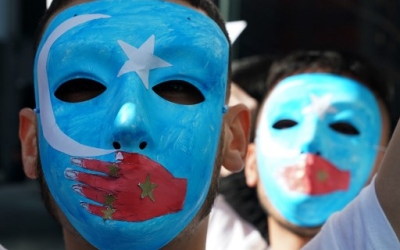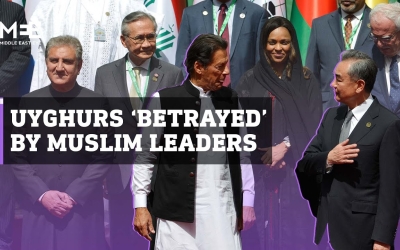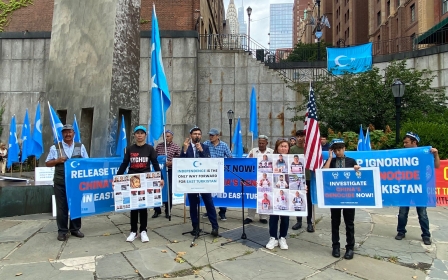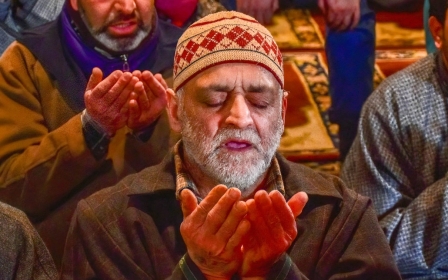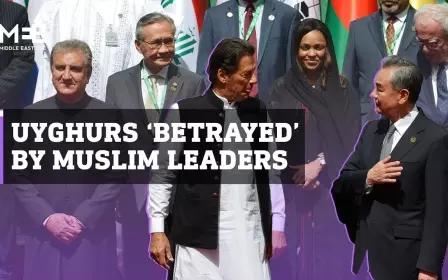China: UN Uyghur report met with silence in Middle East
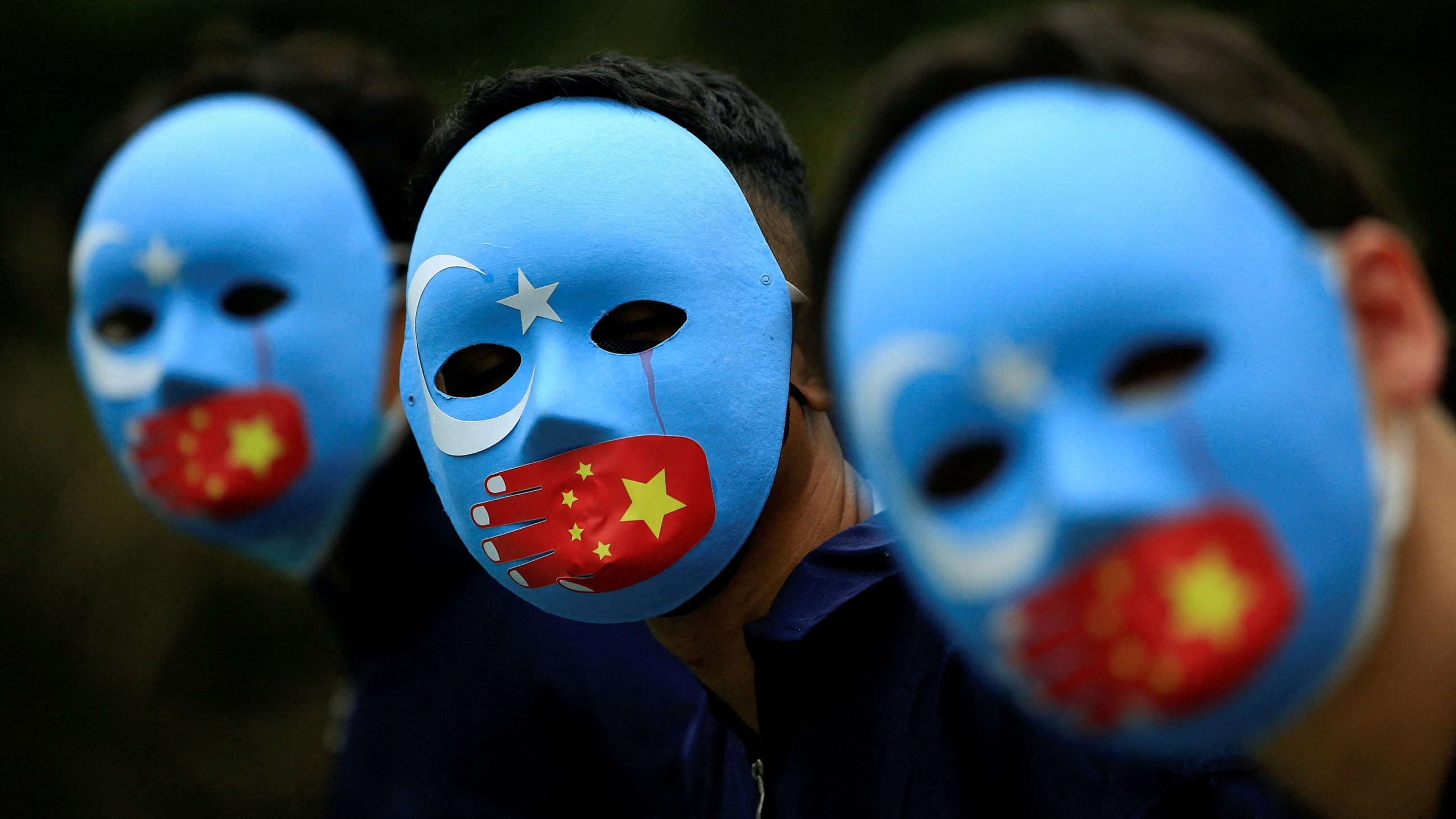
China may have committed “crimes against humanity” in its Xinjiang Uyghur Autonomous Region (XUAR) against Uyghurs and other Muslim minorities, according to a long-awaited United Nations assessment published late on Wednesday.
The 45-page report, issued by the United Nations High Commissioner for Human Rights (OHCHR) and over a year in the making, detailed a string of rights violations against Uyghurs and other Muslim minorities in China’s far-western region, bringing the UN seal to many of the allegations long brought by activist groups, western nations and the Uyghur community in exile.
The explosive allegations have been rejected angrily by China, and met with silence by Muslim-majority countries in the Middle East, North Africa and beyond, many of which are developing strong ties with Beijing.
'The extent of arbitrary and discriminatory detention of members of Uyghur and other predominantly Muslim groups... may constitute international crimes, in particular crimes against humanity'
- United Nations High Commissioner for Human Rights (OHCHR)
"Serious human rights violations have been committed in XUAR in the context of the government's application of counter-terrorism and counter-'extremism' strategies," the UN report said.
"The extent of arbitrary and discriminatory detention of members of Uyghur and other predominantly Muslim groups... may constitute international crimes, in particular crimes against humanity.”
It called on Beijing to immediately release “all individuals arbitrarily deprived of their liberty” and undertake a “full review” of its laws on domestic security and repeal all discriminatory laws.
It also urged the international community to pay "urgent attention" to the human rights situation in Xinjiang.
However, the UN report stopped short of calling China’s actions in Xinjiang "genocide" - as claimed by the United States and a number of western lawmakers.
Uyghur campaigners mostly welcome the UN report and hope it will pave the way for countries and organisations to start taking accountability for their actions on this issue.
The UN assessment was initiated following serious allegations of human rights violations against Uyghurs and other predominantly Muslim communities brought to the attention of the UN Human Rights Office and UN human rights mechanisms since late 2017, particularly in the context of the Chinese government’s policies and measures to combat terrorism and “extremism”.
Michelle Bachelet, UN high commissioner for human rights, said she was determined to release the report before her four-year term expired at the end of August - and did so with 13 minutes to spare at 11.47 pm in Geneva.
Human rights as ‘political tool’
Beijing has long opposed the publication of this UN report. On Thursday it accused the global body of becoming a "thug and accomplice of the US and the West", and said its XUAR assessment “exposed the deep-rooted bias against and ignorance on China of some people in the OHCHR”.
“The so-called ‘assessment’, based on presumption of guilt, uses disinformation and lies fabricated by anti-China forces as its main sources, deliberately ignores authoritative information and objective materials provided by the Chinese government, maliciously distorts China’s laws and policies, denigrates the fight against terrorism and extremism in Xinjiang, and turns a blind eye to the tremendous human rights achievements jointly made by people of all ethnic groups in Xinjiang,” Liu Yuyin, spokesperson for the Chinese Mission to Geneva, said in a statement.
On Thursday’s regular briefing, Chinese foreign ministry spokesman Wang Wenbin told reporters: “The so-called critical report you mentioned is planned and manufactured first-hand by the US and some western forces, it is wholly illegal and invalid… The report is a hodgepodge of misinformation, and it is a political tool which serves as part of the West's strategy of using Xinjiang to control China.”
“It is completely a politicised document that disregards facts, and reveals explicitly the attempt of some western countries and anti-China forces to use human rights as a political tool,” he added.
Wang also slammed the UN rights office as having "sunk to becoming the thug and accomplice of the US and the West" but said the report's omission in calling China’s actions genocide shows their "lies... have fallen apart”.
In response to the UN report, China shared its own 100-plus-page document from the Xinjiang provincial government defending its policies in the region.
Sophie Richardson, China director at Human Rights Watch, said the "damning" findings of sweeping rights abuses showed why Beijing "fought tooth and nail" to prevent its publication.
“The United Nations Human Rights Council should use the report to initiate a comprehensive investigation into the Chinese government’s crimes against humanity targeting the Uyghurs and others - and hold those responsible to account,” she said.
Silence from the Middle East
While the UN report makes the rounds on social media and political circuit in the West, there have been few public reactions from Muslim-majority nations in the Middle East.
Beijing and Gulf states are in the process of strengthening ties and deepening economic cooperation in the face of strained relations with the West. Since January they have been trying to revive long-dormant talks aimed at reaching a free trade agreement.
In March, the Organisation of Islamic Countries (OIC) invited Chinese Foreign Minister Wang Yi as a special guest to its annual gathering, a move that drew strong condenmation by Uyghur campaigners who said the body failed to speak up about their plight.
In the conference's press release outlining the agenda of the meeting, several global crises and human rights abuses impacting Muslims were mentioned - with the notable exclusion of the plight of the Turkic Muslim minority community in the Xinjiang region of China.
Out of all the dignitaries, only Turkish Foreign Minister Mevlut Cavusoglu mentioned the plight of Uyghurs during his address at the conference, while listing the struggles of different Muslim communities around the world.
This is not the first time that the Uyghurs have been shunned by Musim-majority nations. In 2019, the United Nations’ human rights body issued a joint statement urging China to end its violations of human rights against Muslims in Xinjiang. The statement was signed by 22 countries, with Muslim-majority countries notably absent from the list of signatories.
‘Accountability starts now’
For years China has been accused of detaining more than one million Uyghurs and other Muslims in the region. Beijing has insisted it is running vocational centres designed to curb extremism instead.
'This is a game-changer for the international response to the Uyghur crisis… the UN has now officially recognized that horrific crimes are occurring'
- Omer Kanat, Uyghur Human Rights Project
But the UN assessment raised concerns about the treatment of people held in China's so-called Vocational Education and Training Centres (VETCs), saying there have been "credible allegations of patterns of torture or ill-treatment, including forced medical treatment and adverse conditions of detention" as well as sexual and gender-based violence.
The UN Human Rights Office could not confirm how many people were affected by the VETCs but concluded that the system operated on a "wide scale" across the entire region.
Following the UN assessment, the Uyghur Human Rights Project (UHRP) published a statement calling for concrete action from governments, multilateral bodies, and corporations.
“This UN report is extremely important. It paves the way for meaningful and tangible action by member states, UN bodies, and the business community,” said World Uyghur Congress President Dolkun Isa. “Accountability starts now.”
“This is a game-changer for the international response to the Uyghur crisis… Despite the Chinese government’s strenuous denials, the UN has now officially recognised that horrific crimes are occurring,” said Uyghur Human Rights Project executive director Omer Kanat.
Non-governmental organisations and campaign groups have said the report should act as a launchpad for further action.
However, Salih Hudayar, a Uyghur-American who campaigns for Xinjiang independence, told AFP the report was "sadly not as strong as we had hoped”.
"Our people have been waiting years for the UN to speak out," said Hudayar. "Unfortunately, because of Chinese government pressure the UN has long remained silent."
This article is available in French on Middle East Eye French edition.
Middle East Eye propose une couverture et une analyse indépendantes et incomparables du Moyen-Orient, de l’Afrique du Nord et d’autres régions du monde. Pour en savoir plus sur la reprise de ce contenu et les frais qui s’appliquent, veuillez remplir ce formulaire [en anglais]. Pour en savoir plus sur MEE, cliquez ici [en anglais].


